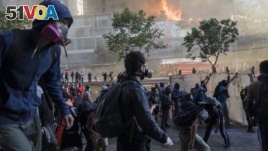29 October, 2019
For two weeks, hundreds of thousands of people have been demonstrating in Chile's capital, Santiago.
Fresh demonstrations and attacks on businesses were reported Monday. Thousands of protesters crowded into central Santiago. One group set fire to a building that houses a fast-food restaurant and stores.
President Sebastián Piñera has tried to show Chileans that he is listening to protesters' calls for greater equality and improved social services. Since the unrest began, Piñera has replaced eight Cabinet ministers with ministers whose politics are said to be more centrist.
Also on Monday, looters attacked a drug store, and there was an attempt to set a train station on fire. Hundreds of thousands of people tried to get home from work on free buses that officials sent to replace trains. The trains have been out of service because of attacks on train stations over the past week.
Santiago has the most modern public transportation system in Latin America.

Protesters walk toward police as firefighters work to put out a fire set by protesters at a shopping center in Santiago, Chile, Monday, Oct. 28, 2019.
Cabinet changes
Piñera has replaced the heads of the interior, treasury, economy, labor and four other ministries with generally younger officials. Political observers say the appointees are thought to be more centrist and accessible.
"Chile has changed and the government must change," Chile's president said.
By Monday, the government had announced no policies to answer the protests over poor social services and the high cost of living.
"A new Cabinet isn't enough. We need real changes in healthcare, education, pensions," said 34-year-old Omar Soto. He operates a mobile phone business.
Almost all of the protesters say they are angry with what they call the neoliberalism that has left Chile with poor public services. These include the private pension system and health and education systems that are a mix of public and private, with better results only for those who have money for the high costs.
Many Chileans talk of waiting a year for an appointment with a medical specialist, or families receiving calls to get appointments for loved ones who died months earlier. Hundreds of thousands of people are struggling with educational loans that can follow them into their 40s and even 50s.
"Last Friday we had a peaceful protest and, being peaceful, they didn't listen to us," said a protester named Sebastián. "You have to get their attention somehow." Sebastián is a 25-year-old welder who did not give his last name, saying he feared authorities.
The government answered the demonstrations and looting with a military operation that has left more than 1,000 people hurt. Some were partially blinded by police or soldiers' gunshot pellets. That information comes from the National Human Rights Institute and the Chilean College of Medicine.
At least 20 people have died as a result of the 11 days of violence. But it is unclear how many were killed by police and how many by looters.
On Monday, the U.N. High Commissioner on Human Rights, former Chilean President Michelle Bachelet, sent a delegation to Chile to investigate. Amnesty International also sent a team.
From overseas, Chile is seen as a Latin American success story. It has had democratically elected presidents. Its economy has grown. Poverty is down. And Chile won Latin America's highest score on the United Nations Human Development Index, or HDI. The HDI compares life expectancy rates, education and national income per person.
In 2010, Chile became the second Latin member of the Organization for Economic Cooperation and Development, or OECD, after Mexico.
Yet, a 2017 United Nations report found that the richest one percent of Chile's population earns 33 percent of the nation's wealth. That helps make Chile the most unequal country in the OECD, slightly worse than Mexico.
Piñera himself is a billionaire, one of Chile's richest men.
Comparably, a 2017 study showed that the richest one percent in the United States owned 40% of the nation's wealth.
I'm John Russell. And I'm Alice Bryant.
Michael Weissenstein and Eva Vergara reported this story for the Associated Press. Alice Bryant adapted it for VOA Learning English. George Grow was the editor.
______________________________________________________________
Words in This Story
looter – n. a person who steals things from a place (such as a store or house) after destruction has been caused by fire, rioting or something else
accessible – adj. easy to speak to or deal with
pension – n. an amount of money that a company or the government pays to a person who is old or sick and no longer works
neoliberalism – n. generally defined as an economic system that favors policies of free-market capitalism
pellet – n. a small metal object that is shot from a gun
score – n. the number of points received in a ranking system